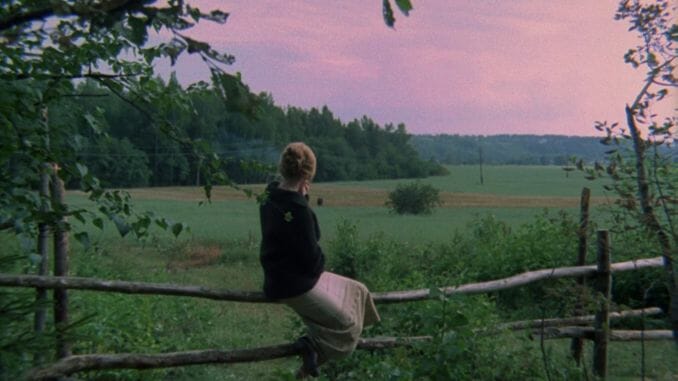Andrei Tarkovsky’s Mirror Continues to Reflect Intergenerational Trauma

In Soviet Russia, a dying man lies in his hospital bed. He reflects on his life: Rights, wrongs, grief and joy. He conjures images of his mother but imagines her with his ex-wife’s face. He pictures himself as a youth in the shape of his adolescent son. Plagued by the pain he has inflicted on others and knowing he can’t make amends, he resigns himself to the past and the life he knew and prepares to die.
Mirror, directed by Andrei Tarkovsky, has been dissected since 1975, and with each interpretation and re-examination, we find new meaning. While the film is incohesive and complicated at times, there is an underlying theme about generational trauma and the effect of outside events changing our lives.
The film’s main outside event is World War II and the Sino-Soviet conflict, which forces the family to evacuate Moscow and live in the countryside to avoid the war. We follow Alexei as he tries to comprehend the events happening around him. Alexei’s mother, Maria, must also deal with the changing world while caring for her children and waiting for her husband, who is away at war. Through a series of events starting in 1935, we observe the confusion and resentment building in characters burdened by the war.
We find ourselves in 2021 in a similar position. We are facing the end of an extended wartime period, with many of us not remembering a time when our country wasn’t occupying another. In 2001, the United States faced the worst attacks ever experienced on U.S. soil. The 9/11 attacks would forever alter the lives of American citizens, specifically the young people who would inherit the U.S. of its aftermath. In the same way that Maria tried to shield Alexei from the horrors of the world, American parents wanted to protect their children.
In Mirror, Maria is a copy editor at a printing press in Moscow. Maria is a career woman who is quite brutal with her dedication to perfection, throwing herself into a panicked frenzy, worried that she missed an edit. Maria’s rigid nature inspires her co-worker to lecture her about behavior, reducing Maria to tears. We catch a glimpse of Russia before the war while she works. The industry surrounding Maria and the city’s modernization give insight into the growing new working world. We see Maria as solid and capable, but as the battle rages on, she contorts into herself and becomes a shell of who she was, eventually straining her relationship with Alexei.
In 2001, the world we knew changed overnight. Parents became paranoid, stories about racially charged violence followed at the heels of the “War on Terror.” Grown-ups became shadows of the people they were before, hiding their children behind them while facing brutality from the events on screen and its manifestations in the behavior of other adults.
Though Mirror’s nonlinear narrative creates a frantic, dreamlike hellscape where the war disintegrates family ties, we manage to find some obstructed sense of familiarity in the extreme dysfunction. During a flashback, we observe an adolescent Alexei rifle training with a dour instructor. Shy and slightly incapable, Alexei struggles to grasp the movement and ultimately begins his failure as a soldier. This intimate look at how Alexei grapples with the masculinity of rifle training and the harsh instructor’s teaching calls to mind the earliest days of the war in November 2001, where the United States sent 1,300 American troops to Afghanistan. Footage of the young men was shown on the evening news. Reports soon accompanied dinners on soldiers moving in and presidential reassurances.
We watched parents talk, through clenched jaws, to their children at the dinner table about the rising death tolls and what being safe in America meant for them. The children who came from Iraq, Afghanistan—any Middle Eastern country—or just happened to be racially ambiguous were instructed on how to behave so as not to be harmed by other students. Even after two decades, the racist attacks remain part of their lives.
-

-

-

-

-

-

-

-

-

-

-

-

-

-

-

-

-

-

-

-

-

-

-

-

-

-

-

-

-

-

-

-

-

-

-

-

-

-

-

-








































